Forward Party Joins Petition to SCOTUS Against State of Florida

Right now, the divide between the Republican and Democratic Parties appears beyond repair. The political rhetoric is toxic, the nation’s leadership puts party gain before lasting solutions, and few voters actually feel heard by the people elected to represent them.
At a time when it seems things will only get worse from here, the Independent Voter Project filed an amicus brief with the U.S. Supreme Court along with Open Primaries and the Forward Party in support of a lawsuit that targets a culprit of division:
Closed partisan primary elections, which incentivize public officials to speak to a small partisan minority of voters, rather than the electorate at-large.
A single retired attorney in Florida, Michael J. Polelle, has petitioned the Supreme Court (SCOTUS) to hear his lawsuit against the State of Florida and its secretary of state, challenging the constitutionality of their closed primary system.
Under this system, over 3.4 million independent voters are denied access to crucial taxpayer-funded elections because they choose not to affiliate with either the Republican or the Democratic Party.

In other words, their right to equal and meaningful participation and representation is conditioned on joining a private political organization.
Polelle is asking SCOTUS to weigh in on a question the high court has never answered directly: Does the right to vote at an integral stage of a publicly funded election derive from citizenship, or from membership in a political party?
The Independent Voter Project (IVP) is no stranger to bringing this question before the courts. In 2014, it challenged the constitutionality of New Jersey’s closed primary system, as well as California’s unconstitutional use of semi-closed primaries in presidential elections.
In both cases, IVP has already petitioned the Supreme Court to answer this fundamental question.
Open Primaries has challenged the constitutionality of closed primaries in New Mexico and – more recently – in Maryland. It has also supported other lawsuits this year in Oregon, Pennsylvania, and Wyoming.
The Forward Party, founded by former Democratic presidential candidate, businessman, and attorney Andrew Yang, is one of the only political parties in the U.S. with a platform that prioritizes systemic election reforms like open primaries and ranked choice voting.
The amicus these groups filed offers additional legal background and insight in support of Polelle’s petition, including previous SCOTUS precedent holding that a voter’s fundamental rights cannot be limited in the primary any more than they could be in a general election.
More simply: a state cannot prevent a voter from participating in a primary because the voter chooses not to join a party.
The lower court in this case already recognized the unfair burden and discrimination of closed primaries against independent voters, even if it was not ready to rule that closed primaries were unconstitutional.
The amicus also points out that a majority of Florida voters already made it clear at the ballot box that they do not want a primary election system that treats registered independents like second-class voters.
Fifty-seven percent (57%) of Floridians voted in favor of Amendment 3 in 2020, which would have implemented a nonpartisan, Top Two primary in which all voters and candidates participate on a single primary ballot, regardless of party. Under new state law, it needed 60% to pass.
At a time of seemingly insurmountable division in the country, could the Supreme Court be ready to hear a case that targets one big cause of our divisive politics?
 Shawn Griffiths
Shawn Griffiths






